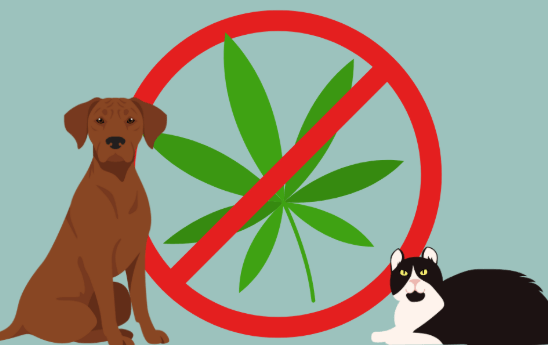The increasing popularity of CBD among pet owners raises important questions regarding its safety, particularly the potential for overdose in dogs. While instances of overdose are deemed rare, understanding the implications and symptoms associated with excessive consumption is vital for responsible pet care. Owners must be vigilant about dosage and the individual health status of their pets. As we explore the nuances of this topic, it becomes essential to consider not only the signs of overdose but also the best practices for ensuring a safe experience with CBD for our canine companions.
Understanding CBD and Dogs
Cannabidiol (CBD), a non-psychoactive compound derived from the cannabis plant, has gained attention for its potential therapeutic benefits in dogs, particularly in managing conditions such as anxiety, pain, and inflammation.
Research indicates that CBD may positively impact dog health by enhancing overall well-being and mitigating discomfort.
As pet owners seek natural alternatives, understanding CBD benefits is essential for informed decision-making regarding canine care.
See also: Can I Travel With Cbd Internationally
Can Dogs Overdose on CBD?
The potential for dogs to overdose on CBD is a critical concern for pet owners and veterinarians alike.
Understanding the appropriate CBD dosage for dogs, recognizing the signs of overdose, and adhering to safe usage guidelines are essential for ensuring the health and safety of canine companions.
This discussion will provide evidence-based insights into these vital aspects of CBD use in dogs.
Understanding CBD Dosage
Determining the appropriate CBD dosage for dogs is crucial to avoid potential adverse effects, including the risk of overdose.
CBD research indicates that optimal dosing can enhance CBD benefits, providing relief from anxiety and inflammation.
It is essential to consider individual factors such as weight and health status when calculating dosage, ensuring a safe and effective experience tailored to each dog’s needs.
Signs of Overdose
Recognizing the signs of CBD overdose in dogs is essential for pet owners to ensure their animal’s safety and well-being.
Overdose symptoms may include excessive lethargy, vomiting, diarrhea, and disorientation.
In cases of suspected overdose, prompt overdose management is crucial, involving immediate veterinary consultation and supportive care.
Understanding these signs aids in mitigating risks associated with CBD use in canine companions.
Safe Usage Guidelines
To ensure the safe administration of CBD to dogs, it is important for pet owners to adhere to recommended dosage guidelines and consult with a veterinarian to tailor the treatment to their pet’s specific needs.
Prioritizing CBD safety is crucial for dog health, as individual responses may vary.
Regular monitoring and adjustments based on the dog’s condition can further mitigate risks associated with potential overdose.
Signs of CBD Overdose
A CBD overdose in dogs can manifest through a variety of symptoms, including lethargy, increased thirst, and gastrointestinal distress.
Other overdose symptoms may include uncoordinated movements, excessive drooling, and changes in appetite.
It is crucial for pet owners to recognize these dosage effects to prevent potential harm.
Monitoring your dog’s response to CBD is essential for ensuring their well-being and safety.
Safe Dosage Guidelines
Establishing safe dosage guidelines for CBD in dogs is crucial to ensure their health and well-being.
Recommended dosages can vary based on factors such as the dog’s weight, age, and specific health conditions.
Additionally, understanding the signs of overdose is essential for pet owners to monitor their pets effectively and respond promptly if necessary.
Recommended CBD Dosages
Determining the appropriate CBD dosage for dogs is essential to ensure safety and efficacy, as the optimal amount can vary based on factors such as the dog’s weight, age, and specific health conditions.
Common dosage methods include oils, treats, and capsules.
Adhering to recommended guidelines can maximize CBD benefits while minimizing the risk of adverse effects, promoting overall well-being in canine companions.
Factors Affecting Dosage
Various factors influence the appropriate CBD dosage for dogs, including body weight, age, health status, and the specific condition being treated.
Dosage variability is significant, as smaller dogs may require a lower dosage compared to larger breeds.
Weight considerations are crucial; administering CBD based on an individual dog’s weight ensures safety and efficacy, allowing for tailored treatment plans that enhance overall well-being.
Signs of Overdose
Recognizing the signs of CBD overdose in dogs is essential for pet owners to ensure their animals’ safety, as excessive consumption can lead to adverse effects that may require immediate veterinary attention.
Overdose symptoms may include lethargy, vomiting, diarrhea, tremors, and loss of coordination.
Prompt identification of these symptoms is crucial for maintaining pet safety and ensuring appropriate intervention when necessary.
Factors Influencing Dosage
The appropriate dosage of CBD for dogs is influenced by several key factors, including the animal’s weight, age, health status, and the specific condition being treated.
Dosage variability may arise due to individual breed sensitivity, as some breeds metabolize substances differently.
Understanding these factors ensures that pet owners can tailor CBD use effectively, minimizing risks while optimizing therapeutic benefits for their dogs.
Types of CBD Products
A variety of CBD products are available for canine use, each designed to meet different therapeutic needs and preferences.
Common formulations include CBD oil, which offers direct dosing flexibility; CBD treats, which provide a palatable option for administration; and topical applications, which target localized discomfort.
Understanding these product types is essential for appropriate usage and to mitigate potential overdose risks in dogs.
CBD Oil for Dogs
Various types of CBD products are available for dogs, each formulated to cater to different needs and preferences, ensuring that pet owners can select the most suitable option for their animal’s health and wellness.
CBD oil is particularly popular due to its potential health benefits, including anxiety relief and anti-inflammatory effects.
Understanding CBD legality is essential for responsible usage in canine care.
CBD Treats Overview
CBD treats for dogs are specifically formulated products that combine cannabidiol with palatable ingredients, providing an alternative means of administering CBD while appealing to canine preferences.
Various CBD treat types include biscuits, chews, and soft treats, each offering distinct CBD treat benefits such as anxiety relief, pain management, and improved overall wellness.
These treats facilitate compliance and enhance the pet’s quality of life.
Topical CBD Applications
Utilizing topical applications of cannabidiol can provide localized relief for dogs suffering from conditions such as arthritis, skin irritations, and inflammation, enhancing their overall comfort and well-being.
In terms of effectiveness comparison, topical CBD products may offer targeted relief with minimal systemic absorption, reducing the risk of adverse effects.
This approach allows pet owners to address specific issues while ensuring their dog’s safety.
Potential Side Effects
A range of potential side effects may occur when dogs are administered CBD, necessitating careful monitoring of their response to the compound.
Commonly reported issues include lethargy, gastrointestinal upset, and changes in appetite, which may indicate CBD toxicity.
Understanding these effects is crucial for maintaining optimal canine health, ensuring that CBD use remains within a safe and effective range for our pets.
What to Do if Overdose Occurs
In cases where a dog is suspected of having overdosed on CBD, immediate attention and intervention are critical to mitigate potential health risks.
Initiate emergency response protocols by monitoring vital signs and behavior.
Seek veterinary assistance promptly, as professionals can administer appropriate treatments to counteract the effects of the overdose.
Quick action is essential for the dog’s safety and recovery.
Consulting Your Veterinarian
Consulting your veterinarian is essential for determining the appropriate dosage and assessing the potential risks associated with CBD use in dogs.
Vet recommendations are invaluable, as they provide tailored dosage consultation based on your pet’s specific health needs and conditions.
Engaging in an informed dialogue with your veterinarian ensures responsible use of CBD, promoting your dog’s well-being while minimizing the risk of adverse effects.
CBD Alternatives for Dogs
Exploring CBD alternatives for dogs can provide additional options for pet owners seeking to manage their pets’ health and wellness without the potential risks associated with CBD use.
Natural CBD alternatives, such as hemp oil, turmeric, and chamomile, offer various therapeutic benefits.
Additionally, exploring different CBD product types, like treats and topicals, may enhance efficacy while minimizing the likelihood of adverse reactions.
Conclusion
In conclusion, understanding the implications of CBD use in dogs is essential for ensuring their safety and well-being.
Recognizing potential overdose symptoms, adhering to safe dosage guidelines, and considering individual factors can mitigate risks.
Vigilance in monitoring pets post-administration fosters a proactive approach to health.
Consulting a veterinarian provides professional guidance, while exploring alternative remedies may offer additional avenues for care.
Ultimately, informed decision-making supports optimal outcomes for canine health and enhances the human-animal bond.





